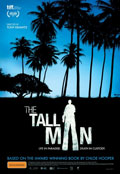
Directed by
Tony Krawitz
84 minutes
Rated M
Reviewed by
Sharon Hurst

The Tall Man
Synopsis: In November 2004, on the beautiful tropical “paradise” of Palm Island, indigenous man Cameron Doomadgee swore at police officer Chris Hurley. An arrest ensued, then a scuffle, and 45 minutes later Doomadgee lay dead in the police cell with massive internal injuries. Despite multiple inquests still no definitive explanation has been found.This sad and alarming documentary traces a catastrophic incident in a part of our country where two cultures attempt to co-exist and where, in this case, the two groups both believe they have been wronged.
Director Tony Krawitz deliberately limits narration in his film. What he gives us is direct comment and anecdotal evidence from those involved. From the Queensland Coroner’s Court he got access to the videos made the day after the event in which Hurley maintains that there was a scuffle and that he and Doomadgee fell heavily. We hear evidence from Roy Bramwell, a local who was in the cop shop at the time, arrested for drunkenness and beating women in his family. Roy maintains he saw Hurley bashing Doomadgee. We meet the many members of Dooomadgee’s family, including his son Eric whose life was tragically impacted upon by his father’s death. There is Tracey, Doomadgee’s de facto wife and many town and family members who obviously loved Cameron. We also meet people from remote outback places like Burketown, where locals attest to the fine nature of Hurley, a cop dedicated to the indigenous people, setting up activity groups for the youth, and an all-round good bloke. We see excerpts from court proceedings, inquests and more – all constructed in a way to invite us to be like a jury and make up our own minds.
On occasion we hear a little about the history of the island – a place run almost like a penal settlement, where indigenous people of many different tribes were subject to mission guardianship. In stark contrast to all the drama, a few idyllic shots show the impossibly blue water and vivid foliage and carefree kids fishing and riding horses,. This makes all the more shocking the dreadful reality of a community riddled with alcohol abuse, constant physical violence, and a police force with the invidious task of trying to keep order.
The issues are so vexed and complicated that the truth is elusive, although there would appear to be serious collusion amongst the police and government members, along with tainting of evidence at the crime scene. At times, certain shots gets a little repetitive, and the number of turnabouts in the many inquests and trials that continued on for years is daunting. And some of the video footage is very grainy. These issues aside, nothing can diminish the importance of this story as another sorry chapter in the seemingly insoluble problem of how to improve white-indigenous relationships.
Want something different?





